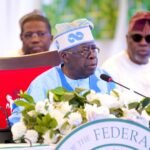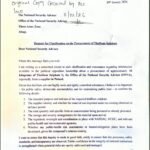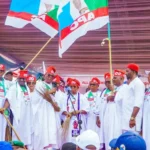
By Paul Ejime
In its usual stealthy but deadly manner, death has again struck, leaving a huge vacuum and an irreparable loss in its trail.
I trust that in his gentlemanly, unassuming character, Alhaji Isa Husseini would accommodate this humble tribute. I had been processing the news of his sudden passing since the 7th of January 2024 and the essence of life.
There was no warning only the announcement of his demise from a short illness and then notice about his burial according to Islamic rites all within 24 hours.
This homage is hardly sufficient to a colleague, who was always welcoming with a warm smile, planted on his shining “baby face” with a unique gap tooth, trademark spectacles and cap to match.
Isa and I met for the first time in the ancient northern city of Kano, during British “Iron Lady” Prime Minister Margaret Thatcher’s visit to Nigeria on the 7th of January 1988, exactly 36 years before his death.
It was at the peak of the anti-apartheid struggle and many Nigerians were angry with the August visitor for opposing sanctions against the Apartheid regime in South Africa.
But in agreeing to the visit, then Nigerian President Ibrahim Babangida must have weighed the importance of Anglo-Nigerian relations which both countries, can never take for granted.
The Nigerian Labour Congress (NLC) and various youth and student groups had mobilized for mass protests, but Nigeria was under a military dictatorship, and public protests were outlawed by the authorities.
Even so, some flag-burning in defiance of the general ban on protests took place in Lagos in front of the Yaba headquarters of the NLC, the nation’s umbrella trade union movement.
A small group of demonstrators also displayed anti-Thatcher banners outside the Murtala Mohammed International Airport, in Ikeja, Lagos when Thatcher flew in.
Fortunately, no violence was reported.
That visit was also significant because it coincided with the implementation of the Thatcher administration’s new visa restrictions announced in September 1986 for India, Pakistan, Bangladesh, Nigeria, and Ghana, which further eroded the visa-free advantages once enjoyed by many Commonwealth countries that shared colonial and historical ties with Britain.
Mrs. Thatcher, the no-nonsense British longest-serving Prime Minister was on her first visit to Africa since the 1979 Commonwealth Conference in Zambia.
She came prepared, telling reporters traveling with her from Nairobi, Kenya: “I can cope with a few demonstrations… that won’t upset things.”
As part of her two-day Nigeria visit, she met with her chief host President Babangida his government officials, and the Emir of Kano, and was also scheduled to address a Press Conference in Kano.
The Press Conference was for selected senior editors and I had the privilege of representing the Editor-In-Chief of News Agency of Nigeria (NAN), Malam Wada Maida, now of blessed memory.
There were no mobile phones and other digital technology devices then, but NAN had a reliable wire/radio system for the transmission of news services to its various clients.
With other senior journalists and officials of Nigeria’s Ministry of Foreign Affairs, we flew from Lagos to Kano to await the Prime Minister’s arrival.
But before the meeting at the Emir’s Palace, I had to search for and identify Isa, the NAN Kano Correspondent, with whom I quickly bonded.
We arranged how to file our stories to the Lagos NAN headquarters for dissemination to waiting clients.
Isa and I were meeting for the first time, but you would think we had known each other for years.
Security and movements are usually a challenge during such high-profile visits, so the arrangement that Isa and I quickly put together to effectively cover the Prime Minister’s activities in Kano included how to dash to the NAN Kano office to file our stories.
Luckily, after the Emir’s Palace visit, the planned Press Conference was whittled down to a few Q & A followed by a mad rush to catch the flight back to Lagos.
I quickly handed Isa my handwritten draft to be consolidated with his notes into a story to be wired to our colleagues in the NAN Lagos Newsroom for editing and onward transmission.
With no social media, News Agencies served as the “Mother of Journalism,” which serviced the print and electronic media. Nigeria had a vibrant press, but broadcasting stations were mainly Federal and State government-owned, the space for private broadcasting had not opened up then.
Isa made sure that “our copy” from Kano reached Lagos satisfying the major attributes of top-flight journalism – Accuracy, Simplicity, and Speed/Immediacy.
Our relationship grew in leaps and bounds and we occasionally reminisced on “our Kano coverage” experience, which incidentally, marked my elevation to the position of NAN Diplomatic Correspondent, and later War Correspondent in Liberia, Sierra Leone; coverage of the Nigeria-Cameroon Bakassi duspute, and subsequently, the West Africa Bureau Chief of the Senegal-based Pan-African News Agency (PANAPRESS).
The rest, they often say is history, but Prime Minister Thatcher’s visit to Nigeria in 1988 and the collegiate, professional collaboration it ignited between Isa and me, will remain an indelible spotlight on my career.
I know that not a few colleagues at NAN and other media organizations have similar positive stories to share about Isa Husseini, a thorough-bred professional, whom I nicknamed “Gentleman
Journalist.”
Isa, who passed on to eternal at 72, retired from NAN as a Marketing Director.
His remains have since been laid to rest in Tudun Wada, Kaduna South Local Government Area of Kaduna State.
He left behind his widow, seven children, and grandchildren.
*Adieu, dear Isa. May your humble soul rest in perfect peace. Amen!*











